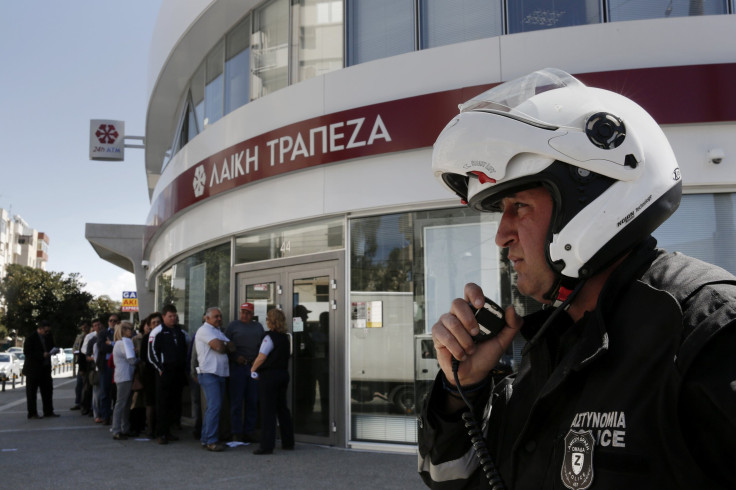Cyprus Banks Reopen, Tight Withdrawal Limit, Heavy Security Prevents Bank Runs; Stock Market Closed Until Next Week


This is a developing story.
12:50 EDT The calm and orderly fashion with which Cypriot banks reopened Thursday kept global markets quiet as well. In some cases markets were gaining. Britain's FTSE 100 index, France's CAC 40 and Germany's DAX all posted gains, as did the euro, which by mid-afternoon in New York trading climbed off an approximately four-month low to $1.28. U.S. and German government bonds declined, as did gold.
In Brussels, the European Commission issued a statement Thursday defending Cyprus' capital controls.
"The stability of financial markets and the banking system in Cyprus constitutes a matter of overriding public interest and public policy justifying the imposition of temporary restrictions on capital movements," the commission said.
9:05 EDT Cypriot banks reopened Thursday but depositors faced tight limits on how much they could withdraw, resulting in the once-feared event coming off with a whimper instead of a bang.
After nearly two weeks of being closed to prevent a bank run, the government allowed depositors back to withdraw money but capped such actions at €300 ($384) in cash per day from each bank in which they have an account. Businesses face a daily limit on transactions of €5,000. That amount is also the monthly limit on credit card transactions. People leaving Cyprus are only being allowed to take out €1,000 per trip.
The upshot of the tightly controlled reopening at 6 a.m. EDT was small lines of depositors calmly queuing up at their banks, the Financial Times said. The capital controls are set to last one week, after which the government will decide whether to extend them or begin lifting them.
The government shut down the banks March 16 after it negotiated a €10 billion bailout package with the troika, as the European Union, the European Central Bank and the International Monetary Fund are collectively known, to escape a financial meltdown. However, first time in its history of rescuing euro zone economies, the troika successfully demanded that residents of the nation being rescued contribute to the bailout. Specifically, depositors with bank balances of more than €100,000 will face a one-time levy of as much as 40 percent of those balances.
In anticipation of a run on banks the government not only put strict limits on what could be withdrawn but also loaded up the banks with cash. A heavily guarded convoy of trucks carrying euros arrived Wednesday at the compound of the central bank in the capital Nicosia to prepare for the reopening. A helicopter hovered overhead as police with rifles surrounded the compound.
Cyprus' central bank gets cash from the European Central Bank (ECB) in Frankfurt, Germany, like the rest of European countries who use the euro. According to officials, there will be enough funds to meet the demands of residents who have money saved in banks, but the ECB wouldn’t say how much cash was brought to the island.
Cyprus has nearly 860,000 people and some €68 billion in its banks, which makes the country's financial system about seven times the country's GDP, a dangerous imbalance that Nicosia is working to address.
© Copyright IBTimes 2025. All rights reserved.






















